As someone who believes that science has little value if it remains locked within academic walls, I’ve always tried to communicate ideas about technology, learning, and critical thinking in accessible and engaging ways.
Over the years, I’ve had the privilege to coordinate and deliver more than 200 talks, workshops, and events — across Cyprus, Europe, and beyond — aiming to connect with diverse audiences of all ages and backgrounds. These moments, whether in a school classroom or a public forum, continue to remind me why sharing knowledge matters.
I’m also one of the founding members of the volunteer group Science Hoaxes, a team dedicated to combating pseudoscience and promoting scientific literacy. Through this initiative, we work to expose misinformation and provide accurate, accessible explanations that help people think more critically about the world around them.
In addition, I contribute regularly to Forbes and Insider, where I try to explore the social and ethical dimensions of artificial intelligence and digital transformation. These platforms offer a chance to reach wider audiences and bring the discussion about science and responsibility into the public space — where it belongs.
02/03/2023: The transformation of Banking and Finance by AI
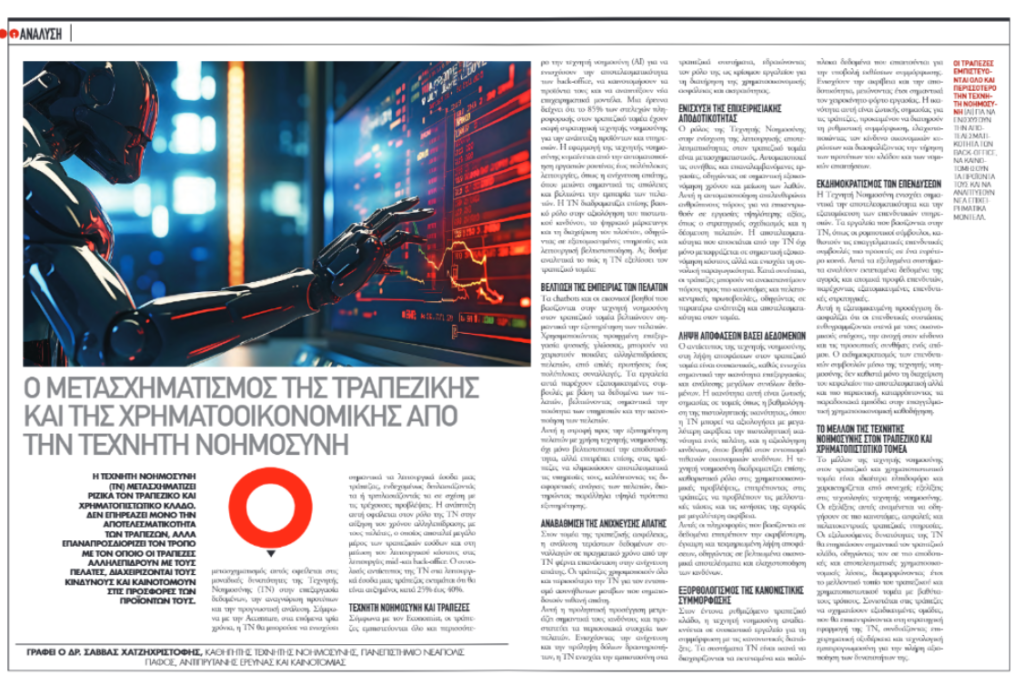
Artificial Intelligence (AI) is radically transforming the banking and finance industry. It is not only affecting the efficiency of banks, but redefining how banks interact with customers, manage risk and innovate in their product offerings. This transformation is driven by AI’s unique capabilities in data processing, pattern recognition and predictive analytics. According to Accenture, AI could significantly boost a bank’s operating income over the next three years, potentially doubling or tripling it from current projections. This growth is driven by the role of AI in increasing customer interaction time, which is a large part of bank revenues, and reducing operating costs in mid and back-office functions. The overall impact of AI on a bank’s operating income is estimated to be an increase of 25% to 40%.
Find the complete article in the March issue of the Insider magazine.
02/12/2023: From scientific citations to chasing followers on Instagram.
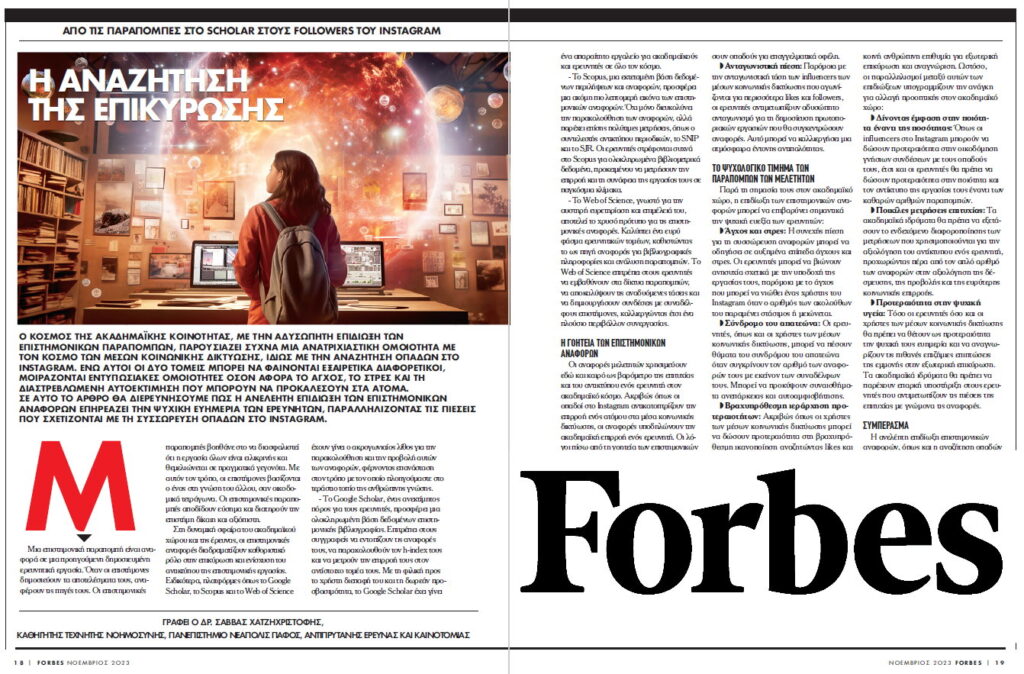
Three months ago, I embarked on a mission to amplify my science communication by enhancing my Instagram presence. This journey led to an insightful revelation. Despite the apparent divergence between the realms of research and social media, I discovered they possess profound parallels, particularly in the way they can induce anxiety and stress and impact self-esteem. This experience highlighted the unexpected emotional challenges inherent in both fields, underscoring the need for mindful engagement and self-care in these demanding arenas.
Find the complete article in the December issue of the Forbes magazine.
13/10/2023: Adaptive Learning and Artificial Intelligence: Revolutionizing Education with Artificial Intelligence
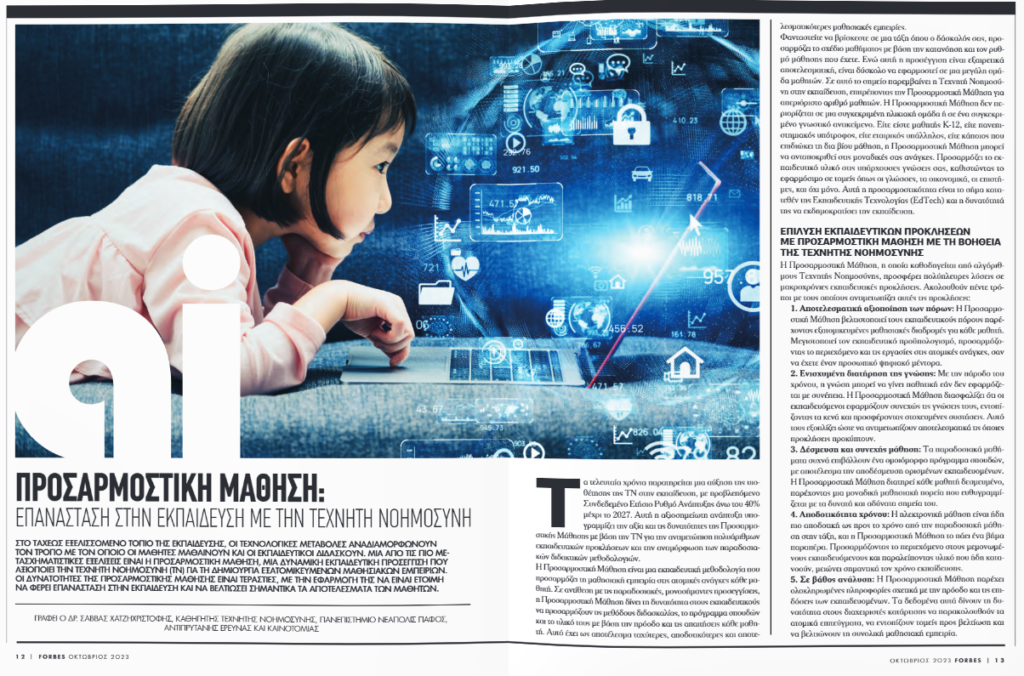
Technological developments are reshaping how students learn, and teachers teach in the rapidly evolving education landscape. One of the most transformative developments is Adaptive Learning, a dynamic educational approach that leverages Artificial Intelligence (AI) to create personalized learning experiences. The potential of Adaptive Learning is vast, with its application poised to revolutionize education and significantly improve student outcomes.
Find the complete article in the October issue of Forbes magazine.
29/09/2023: Unlocking Synergy: Responsible AI’s Impact on Corporate Social Responsibility
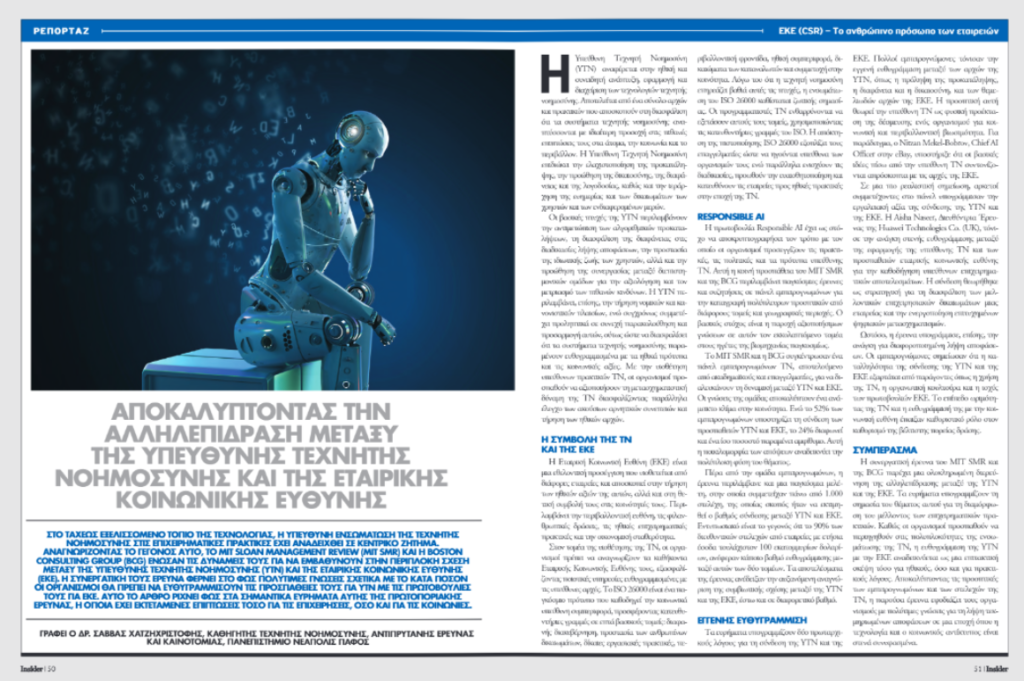
The responsible incorporation of AI into business operations has become a pivotal concern in our ever-changing technological landscape. Acknowledging this imperative, MIT Sloan Management Review (MIT SMR) and Boston Consulting Group (BCG) have united to explore the intricate interplay between Responsible AI (AI) and Corporate Social Responsibility (CSR). Their combined research endeavors reveal invaluable insights into whether organizations should harmonize their AI endeavors with their CSR commitments. This article elucidates the pivotal discoveries from this pioneering research, offering profound implications for corporate entities and society.
Find the complete article in the September issue of Insider magazine.
30/08/2023: Revealing the ecological consequences of artificial intelligence: a growing environmental concern
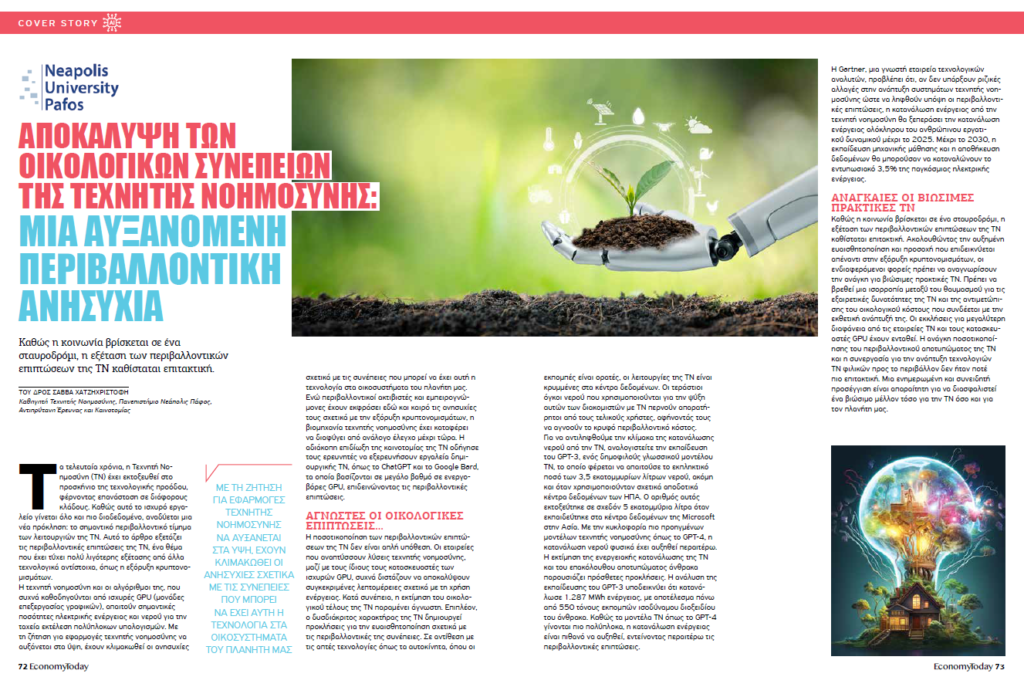
Recently, Artificial Intelligence (AI) has rapidly advanced to become a pivotal force driving technological innovation and instigating transformative changes across diverse industries. However, as the pervasive deployment of this potent tool continues, it unveils a fresh challenge: the substantial ecological cost entailed by AI operations. This article meticulously delves into the environmental ramifications of AI—a subject that has regrettably garnered notably less attention compared to its technological peers, such as cryptocurrency mining.
Find the complete article in the August issue of Economy Today.
04/08/2023: Shaping the European digital landscape

Over the past two decades, digital platforms like Amazon, Google, and Apple have become indispensable but also raised concerns about their influence on democracy, rights, societies, and the economy. Their control over information access and innovation poses potential issues. The European Parliament adopted two significant legislations, the Digital Markets Act (DMA) and the Digital Services Act (DSA), on 5 July 2022 to address this. These rules aim to create a safer, fairer, and more transparent online environment. However, questions remain about their impact on European citizens’ access to development and technological progress.
Find the complete article in the August issue of Insider magazine.
04/08/2023: Cinema forecasts and technological landscape
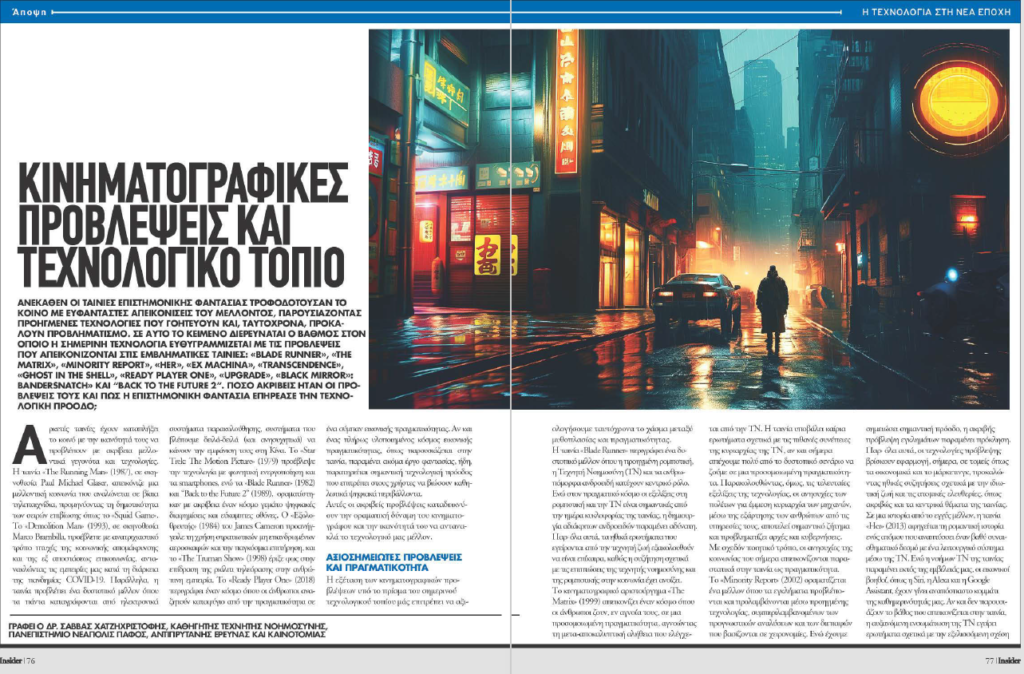
This article examines iconic sci-fi films’ predictions and their impact on technological progress. Assessing films like “Blade Runner,” “The Matrix,” “Minority Report,” “Her,” “Ex Machina,” and more, we analyze how closely today’s technology aligns with their futuristic portrayals. Delving into the accuracy of these predictions, we also delve into the influence of science fiction on technology.
Find the complete article in the August issue of Insider magazine.
25/06/2023: Digital Literacy in the Age of Artificial Intelligence
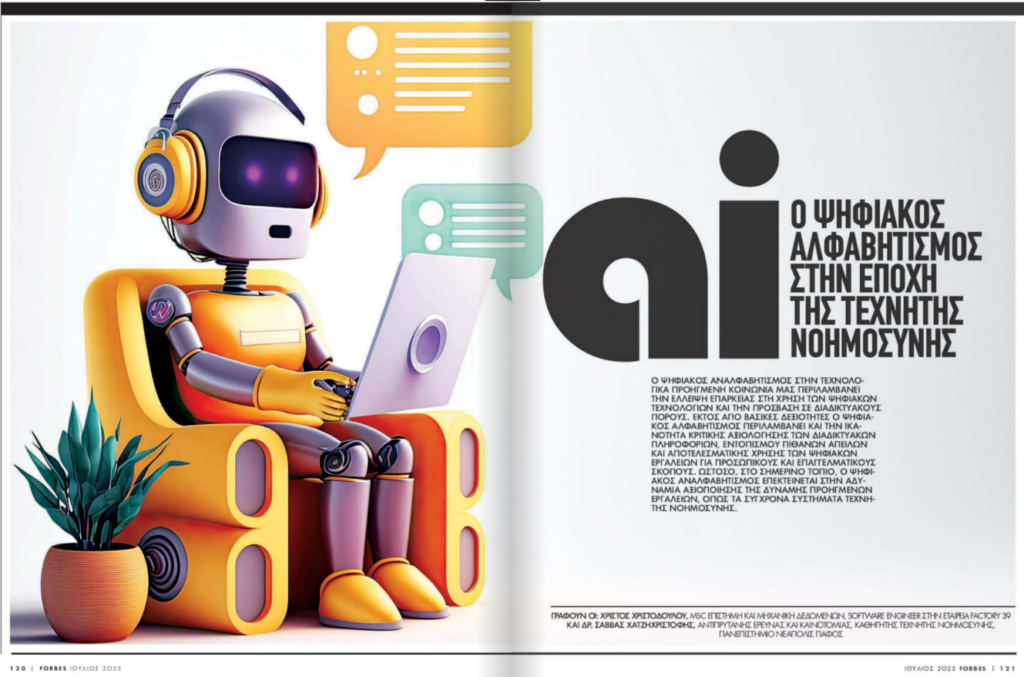
Digital illiteracy in our technologically advanced society includes a lack of proficiency in digital technologies and access to online resources. Digital literacy includes basic skills and the ability to critically evaluate online information, identify potential threats, and effectively use digital tools for personal and professional purposes. However, in today’s landscape, digital illiteracy extends to the inability to harness the power of advanced tools such as modern artificial intelligence systems.
Find the complete article in the July issue of Fobes magazine.
11/06/2023: Artificial Intelligence and Education: The UNESCO Position
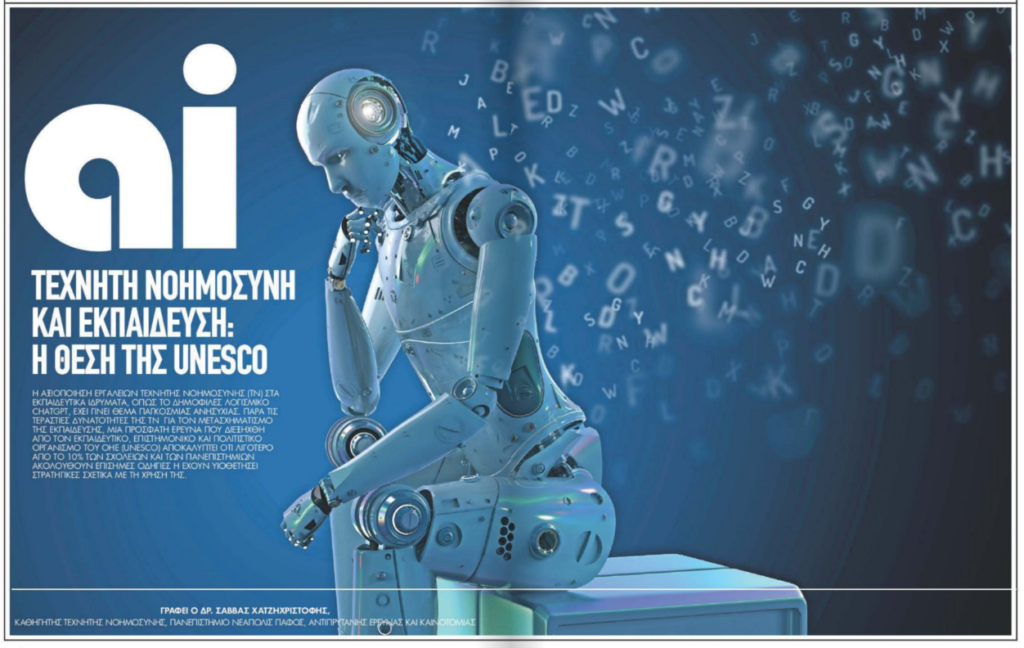
The widespread integration of Artificial Intelligence (AI) tools, including the renowned ChatGPT software, in educational institutions has become a pressing global concern. Despite AI’s immense potential to revolutionize education, a recent survey by UNESCO revealed that fewer than 10% of schools and universities have implemented formal guidelines or strategies for its use. UNESCO acknowledges AI’s intricate nature and far-reaching impact and has developed recommendations to assist governments and stakeholders in harnessing its potential. These recommendations, centered around Sustainable Development Goal 4 (SDG-4) of the United Nations’ 2030 Agenda, aim to bolster education systems worldwide. SDG-4, called the Quality Education Goal, addresses the global need for equitable, inclusive, high-quality education.
Find the complete article in the June issue of Insider magazine.
30/05/2023: The European Union’s position on Artificial Intelligence
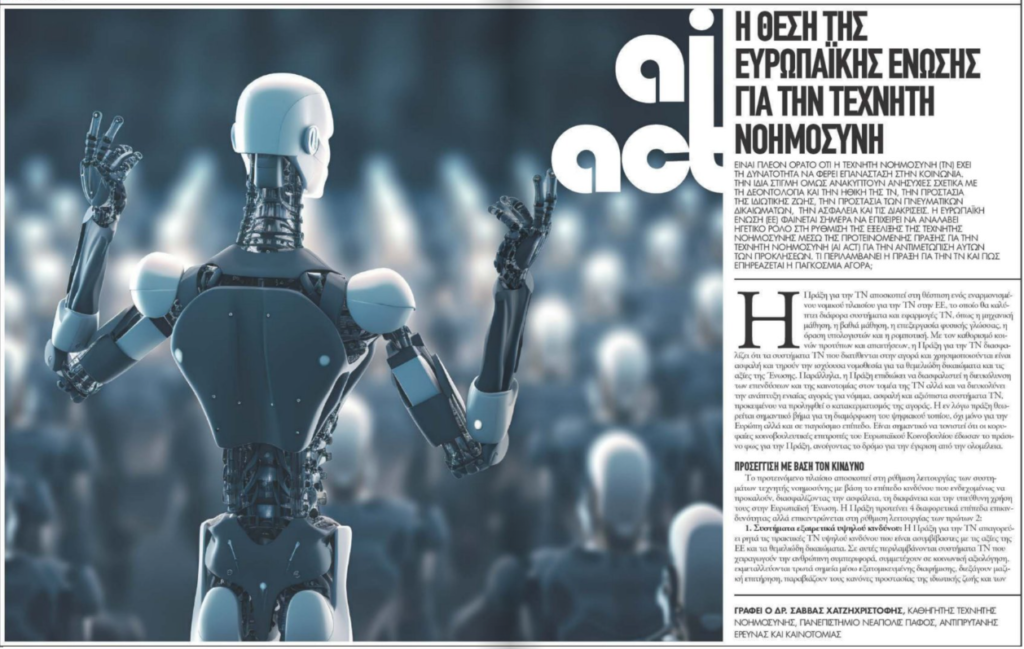
Artificial intelligence (AI) has the power to revolutionize society, but ethical concerns, privacy, intellectual property rights, security, and discrimination remain. The EU aims to lead AI regulation with the proposed AI ACT, addressing these challenges. The AI Act includes strict requirements for high-risk AI systems, transparency measures, data protection standards, and intellectual property safeguards. Its impact on the global marketplace is significant, as companies targeting the EU market must comply. The EU’s AI regulation leadership will likely shape global norms, influencing AI governance worldwide.
Find the complete article in the May issue of Insider magazine.